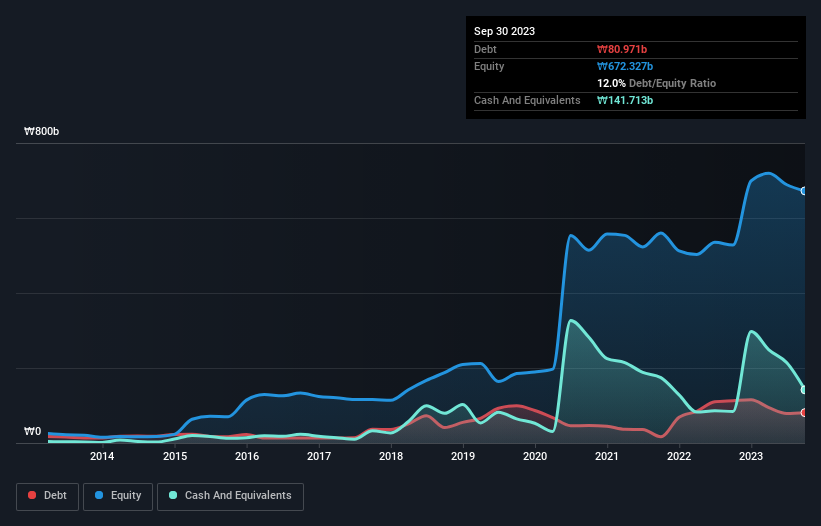The external fund manager backed by Berkshire Hathaway's Charlie Munger, Li Lu, makes no bones about it when he says 'The biggest investment risk is not the volatility of prices, but whether you will suffer a permanent loss of capital.' So it might be obvious that you need to consider debt, when you think about how risky any given stock is, because too much debt can sink a company. As with many other companies HLB Co., Ltd. (KOSDAQ:028300) makes use of debt. But the real question is whether this debt is making the company risky.
When Is Debt A Problem?
Debt assists a business until the business has trouble paying it off, either with new capital or with free cash flow. In the worst case scenario, a company can go bankrupt if it cannot pay its creditors. However, a more frequent (but still costly) occurrence is where a company must issue shares at bargain-basement prices, permanently diluting shareholders, just to shore up its balance sheet. Of course, plenty of companies use debt to fund growth, without any negative consequences. When we think about a company's use of debt, we first look at cash and debt together.
Check out our latest analysis for HLB
What Is HLB's Net Debt?
As you can see below, HLB had ₩81.0b of debt at September 2023, down from ₩113.0b a year prior. However, it does have ₩141.7b in cash offsetting this, leading to net cash of ₩60.7b.

How Strong Is HLB's Balance Sheet?
According to the last reported balance sheet, HLB had liabilities of ₩111.1b due within 12 months, and liabilities of ₩88.4b due beyond 12 months. Offsetting these obligations, it had cash of ₩141.7b as well as receivables valued at ₩8.61b due within 12 months. So its liabilities outweigh the sum of its cash and (near-term) receivables by ₩49.1b.
This state of affairs indicates that HLB's balance sheet looks quite solid, as its total liabilities are just about equal to its liquid assets. So it's very unlikely that the ₩10t company is short on cash, but still worth keeping an eye on the balance sheet. While it does have liabilities worth noting, HLB also has more cash than debt, so we're pretty confident it can manage its debt safely. There's no doubt that we learn most about debt from the balance sheet. But you can't view debt in total isolation; since HLB will need earnings to service that debt. So if you're keen to discover more about its earnings, it might be worth checking out this graph of its long term earnings trend.
In the last year HLB had a loss before interest and tax, and actually shrunk its revenue by 65%, to ₩66b. That makes us nervous, to say the least.
So How Risky Is HLB?
By their very nature companies that are losing money are more risky than those with a long history of profitability. And in the last year HLB had an earnings before interest and tax (EBIT) loss, truth be told. Indeed, in that time it burnt through ₩107b of cash and made a loss of ₩107b. But at least it has ₩60.7b on the balance sheet to spend on growth, near-term. Overall, we'd say the stock is a bit risky, and we're usually very cautious until we see positive free cash flow. There's no doubt that we learn most about debt from the balance sheet. However, not all investment risk resides within the balance sheet - far from it. For instance, we've identified 3 warning signs for HLB (2 can't be ignored) you should be aware of.
At the end of the day, it's often better to focus on companies that are free from net debt. You can access our special list of such companies (all with a track record of profit growth). It's free.
Valuation is complex, but we're here to simplify it.
Discover if HLB might be undervalued or overvalued with our detailed analysis, featuring fair value estimates, potential risks, dividends, insider trades, and its financial condition.
Access Free AnalysisHave feedback on this article? Concerned about the content? Get in touch with us directly. Alternatively, email editorial-team (at) simplywallst.com.
This article by Simply Wall St is general in nature. We provide commentary based on historical data and analyst forecasts only using an unbiased methodology and our articles are not intended to be financial advice. It does not constitute a recommendation to buy or sell any stock, and does not take account of your objectives, or your financial situation. We aim to bring you long-term focused analysis driven by fundamental data. Note that our analysis may not factor in the latest price-sensitive company announcements or qualitative material. Simply Wall St has no position in any stocks mentioned.
About KOSDAQ:A028300
HLB
Manufactures and constructs lifeboats and glass fiber pipes in South Korea and internationally.
Adequate balance sheet with minimal risk.
Market Insights
Community Narratives




